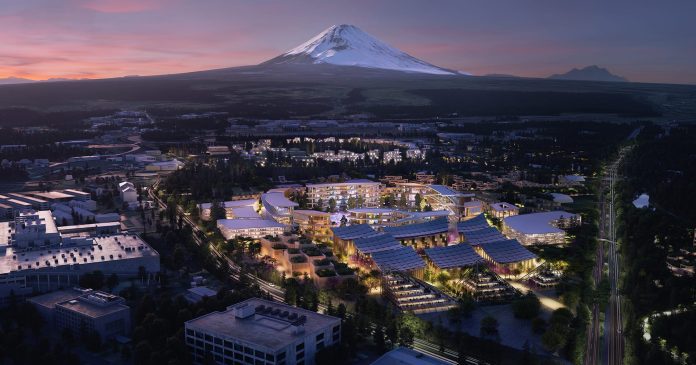Japanese company Toyota unveiled plans to build a prototype “city” of the future on a 175-acre site at the base of Mt. Fuji in Japan.
Called the Woven City, it will be a fully connected ecosystem powered by hydrogen fuel cells, Toyota said in a release.
Envisioned as a “living laboratory,” the Woven City will serve as a home to full-time residents and researchers who will be able to test and develop technologies such as robotics, personal mobility, smart homes and artificial intelligence in a real-world environment.
“Building a complete city from the ground up, even on a small scale like this, is a unique opportunity to develop future technologies, including a digital operating system for the city’s infrastructure. With people, buildings and vehicles all connected and communicating with each other through data and sensors, we will be able to test connected AI technology… in both the virtual and the physical realms… maximizing its potential,” said Akio Toyoda, president, Toyota Motor Corporation.
Toyota also announced that it will extend an open invitation to collaborate with other commercial and academic partners and invite interested scientists and researchers from around the world to come work on their own projects in the Woven City.
“We welcome all those inspired to improve the way we live in the future, to take advantage of this unique research ecosystem and join us in our quest to create an ever-better way of life and mobility for all,” Toyoda added.
For the design of Woven City, Toyota has commissioned Danish architect, Bjarke Ingels, CEO, Bjarke Ingels Group (BIG).
“A swarm of different technologies are beginning to radically change how we inhabit and navigate our cities. Connected, autonomous, emission-free and shared mobility solutions are bound to unleash a world of opportunities for new forms of urban life. With the breadth of technologies and industries that we have been able to access and collaborate with from the Toyota ecosystem of companies, we believe we have a unique opportunity to explore new forms of urbanity with the Woven City that could pave new paths for other cities to explore,” said Bjarke Ingels, founder and creative director, BIG.
The masterplan of the city includes the designations for street usage into three types: for faster vehicles only, for a mix of lower speed, personal mobility and pedestrians, and for a park-like promenade for pedestrians only.
The city is planned to be fully sustainable, with buildings made mostly of wood to minimize the carbon footprint, using traditional Japanese wood joinery, combined with robotic production methods.
Toyota also highlighted that residences will be equipped with the latest in human support technologies, such as in-home robotics to assist with daily living. The homes will use sensor-based AI to check occupants’ health, take care of basic needs and enhance daily life.
To move residents through the city, only fully-autonomous vehicles will be allowed on the main roads.
Toyota plans to populate Woven City with Toyota Motor Corporation employees and their families, retired couples, retailers, visiting scientists, and industry partners. In an initial phase, the city will be home to nearly 2,000 people. The plan is for 2000 people to start,
The groundbreaking for the site is planned for early 2021.

